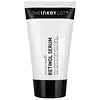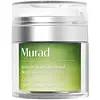What's inside
What's inside
 Key Ingredients
Key Ingredients

 Benefits
Benefits

 Concerns
Concerns

 Ingredients Side-by-side
Ingredients Side-by-side

Water
Skin ConditioningGlycerin
HumectantButylene Glycol
HumectantPropanediol
SolventDicaprylyl Carbonate
EmollientTocopherol
AntioxidantHydroxyethyl Acrylate/Sodium Acryloyldimethyl Taurate Copolymer
Emulsion StabilisingSqualane
EmollientPolysorbate 60
EmulsifyingSorbitan Isostearate
EmulsifyingPhenoxyethanol
PreservativeCaprylyl Glycol
EmollientPhospholipids
Skin ConditioningGlycine Soja Oil
EmollientGlycolipids
Skin ConditioningGlycine Soja Sterols
EmollientRetinyl Acetate
Skin ConditioningDimethicone
EmollientLeuconostoc/Radish Root Ferment Filtrate
AntimicrobialHyaluronic Acid
HumectantDimethyl Isosorbide
SolventHydroxypinacolone Retinoate
Skin ConditioningCarbomer
Emulsion StabilisingPolysorbate 20
EmulsifyingPalmitoyl Tripeptide-1
Skin ConditioningPalmitoyl Tetrapeptide-7
Skin ConditioningSodium Lactate
BufferingTocopheryl Acetate
AntioxidantTetrasodium Glutamate Diacetate
Sodium Hydroxide
BufferingTetrahexyldecyl Ascorbate
AntioxidantWater, Glycerin, Butylene Glycol, Propanediol, Dicaprylyl Carbonate, Tocopherol, Hydroxyethyl Acrylate/Sodium Acryloyldimethyl Taurate Copolymer, Squalane, Polysorbate 60, Sorbitan Isostearate, Phenoxyethanol, Caprylyl Glycol, Phospholipids, Glycine Soja Oil, Glycolipids, Glycine Soja Sterols, Retinyl Acetate, Dimethicone, Leuconostoc/Radish Root Ferment Filtrate, Hyaluronic Acid, Dimethyl Isosorbide, Hydroxypinacolone Retinoate, Carbomer, Polysorbate 20, Palmitoyl Tripeptide-1, Palmitoyl Tetrapeptide-7, Sodium Lactate, Tocopheryl Acetate, Tetrasodium Glutamate Diacetate, Sodium Hydroxide, Tetrahexyldecyl Ascorbate
Water
Skin ConditioningIsostearyl Hydroxystearate
EmollientNiacinamide
SmoothingPropanediol
SolventCaprylic/Capric Triglyceride
MaskingC14-22 Alcohols
Emulsion StabilisingPolymethylsilsesquioxane
Dimethicone
EmollientCetyl Alcohol
EmollientGlyceryl Stearate
EmollientHydrolyzed Yeast Extract
Skin ConditioningIsopropyl Palmitate
EmollientRetinol
Skin ConditioningRetinyl Propionate
Skin ConditioningOleyl Alcohol
EmollientSodium Hyaluronate
HumectantSerine
MaskingHexyldecanol
EmollientGlycine Soja Extract
Skin ConditioningTocopheryl Acetate
AntioxidantGlycine Soja Sterols
EmollientUrea
BufferingYeast Amino Acids
HumectantTrehalose
HumectantInositol
HumectantTaurine
BufferingBetaine
HumectantGlycerin
HumectantPolyglucuronic Acid
Skin ConditioningC12-20 Alkyl Glucoside
EmulsifyingDioscorea Batatas Extract
AntioxidantPentylene Glycol
Skin ConditioningGlyceryl Polyacrylate
Algin
MaskingCaprylyl Glycol
EmollientSwertia Chirata Extract
HumectantLecithin
EmollientPullulan
Disodium Phosphate
BufferingPotassium Phosphate
BufferingPEG-75 Stearate
Ceteth-20
CleansingSteareth-20
CleansingCetyl Hydroxyethylcellulose
Emulsion StabilisingPhenoxyethanol
PreservativeEthylhexylglycerin
Skin ConditioningPicolinamide
EmollientDisodium EDTA
Sodium Hydroxide
BufferingHexylene Glycol
EmulsifyingSodium Benzotriazolyl Butylphenol Sulfonate
UV AbsorberAmmonium Acryloyldimethyltaurate/Vp Copolymer
CI 19140
Cosmetic ColorantCI 14700
Cosmetic ColorantAlpha-Isomethyl Ionone
PerfumingCitronellol
PerfumingParfum
MaskingWater, Isostearyl Hydroxystearate, Niacinamide, Propanediol, Caprylic/Capric Triglyceride, C14-22 Alcohols, Polymethylsilsesquioxane, Dimethicone, Cetyl Alcohol, Glyceryl Stearate, Hydrolyzed Yeast Extract, Isopropyl Palmitate, Retinol, Retinyl Propionate, Oleyl Alcohol, Sodium Hyaluronate, Serine, Hexyldecanol, Glycine Soja Extract, Tocopheryl Acetate, Glycine Soja Sterols, Urea, Yeast Amino Acids, Trehalose, Inositol, Taurine, Betaine, Glycerin, Polyglucuronic Acid, C12-20 Alkyl Glucoside, Dioscorea Batatas Extract, Pentylene Glycol, Glyceryl Polyacrylate, Algin, Caprylyl Glycol, Swertia Chirata Extract, Lecithin, Pullulan, Disodium Phosphate, Potassium Phosphate, PEG-75 Stearate, Ceteth-20, Steareth-20, Cetyl Hydroxyethylcellulose, Phenoxyethanol, Ethylhexylglycerin, Picolinamide, Disodium EDTA, Sodium Hydroxide, Hexylene Glycol, Sodium Benzotriazolyl Butylphenol Sulfonate, Ammonium Acryloyldimethyltaurate/Vp Copolymer, CI 19140, CI 14700, Alpha-Isomethyl Ionone, Citronellol, Parfum
 Reviews
Reviews

Ingredients Explained
These ingredients are found in both products.
Ingredients higher up in an ingredient list are typically present in a larger amount.
Caprylyl Glycol is a humectant and emollient, meaning it attracts and preserves moisture.
It is a common ingredient in many products, especially those designed to hydrate skin. The primary benefits are retaining moisture, skin softening, and promoting a healthy skin barrier.
Though Caprylyl Glycol is an alcohol derived from fatty acids, it is not the kind that can dry out skin.
This ingredient is also used as a preservative to extend the life of products. It has slight antimicrobial properties.
Learn more about Caprylyl GlycolDimethicone is a type of synthetic silicone created from natural materials such as quartz.
What it does:
Dimethicone comes in different viscosities:
Depending on the viscosity, dimethicone has different properties.
Ingredients lists don't always show which type is used, so we recommend reaching out to the brand if you have questions about the viscosity.
This ingredient is unlikely to cause irritation because it does not get absorbed into skin. However, people with silicone allergies should be careful about using this ingredient.
Note: Dimethicone may contribute to pilling. This is because it is not oil or water soluble, so pilling may occur when layered with products. When mixed with heavy oils in a formula, the outcome is also quite greasy.
Learn more about DimethiconeGlycerin is already naturally found in your skin. It helps moisturize and protect your skin.
A study from 2016 found glycerin to be more effective as a humectant than AHAs and hyaluronic acid.
As a humectant, it helps the skin stay hydrated by pulling moisture to your skin. The low molecular weight of glycerin allows it to pull moisture into the deeper layers of your skin.
Hydrated skin improves your skin barrier; Your skin barrier helps protect against irritants and bacteria.
Glycerin has also been found to have antimicrobial and antiviral properties. Due to these properties, glycerin is often used in wound and burn treatments.
In cosmetics, glycerin is usually derived from plants such as soybean or palm. However, it can also be sourced from animals, such as tallow or animal fat.
This ingredient is organic, colorless, odorless, and non-toxic.
Glycerin is the name for this ingredient in American English. British English uses Glycerol/Glycerine.
Learn more about GlycerinGlycine Soja Sterols is derived from the soybean plant. Sterols are an organic compound and technically an alcohol.
Unlike solvent alcohols, glycine soja sterols have emollient properties and help hydrate the skin.
This ingredient may not be Malassezia folliculitis, or fungal-acne safe.
Sterols can be found in plants, animals, and fungi.
Learn more about Glycine Soja SterolsPhenoxyethanol is a preservative that has germicide, antimicrobial, and aromatic properties. Studies show that phenoxyethanol can prevent microbial growth. By itself, it has a scent that is similar to that of a rose.
It's often used in formulations along with Caprylyl Glycol to preserve the shelf life of products.
Propanediol is an all-star ingredient. It softens, hydrates, and smooths the skin.
It’s often used to:
Propanediol is not likely to cause sensitivity and considered safe to use. It is derived from corn or petroleum with a clear color and no scent.
Learn more about PropanediolSodium Hydroxide is also known as lye or caustic soda. It is used to adjust the pH of products; many ingredients require a specific pH to be effective.
In small amounts, sodium hydroxide is considered safe to use. However, large amounts may cause chemical burns due to its high alkaline.
Your skin has a natural pH and acid mantle. This acid mantle helps prevent harmful bacteria from breaking through. The acid mantle also helps keep your skin hydrated.
"Alkaline" refers to a high pH level. A low pH level would be considered acidic.
Learn more about Sodium HydroxideTocopheryl Acetate is AKA Vitamin E. It is an antioxidant and protects your skin from free radicals. Free radicals damage the skin by breaking down collagen.
One study found using Tocopheryl Acetate with Vitamin C decreased the number of sunburned cells.
Tocopheryl Acetate is commonly found in both skincare and dietary supplements.
Learn more about Tocopheryl AcetateWater. It's the most common cosmetic ingredient of all. You'll usually see it at the top of ingredient lists, meaning that it makes up the largest part of the product.
So why is it so popular? Water most often acts as a solvent - this means that it helps dissolve other ingredients into the formulation.
You'll also recognize water as that liquid we all need to stay alive. If you see this, drink a glass of water. Stay hydrated!
Learn more about Water